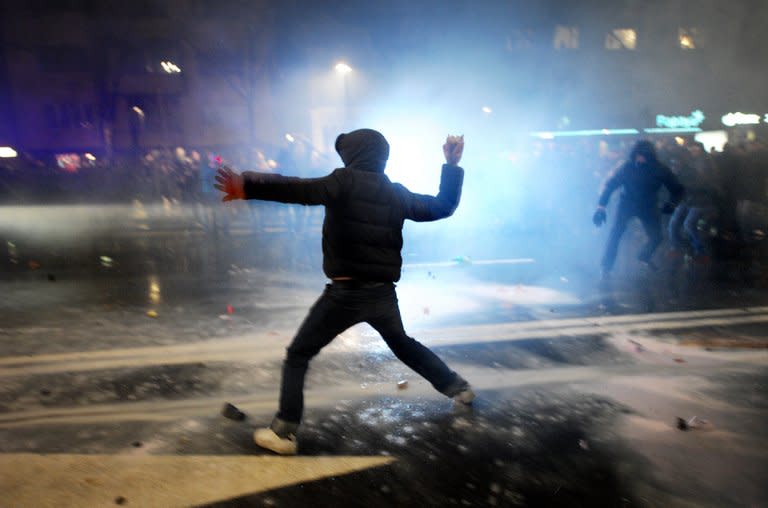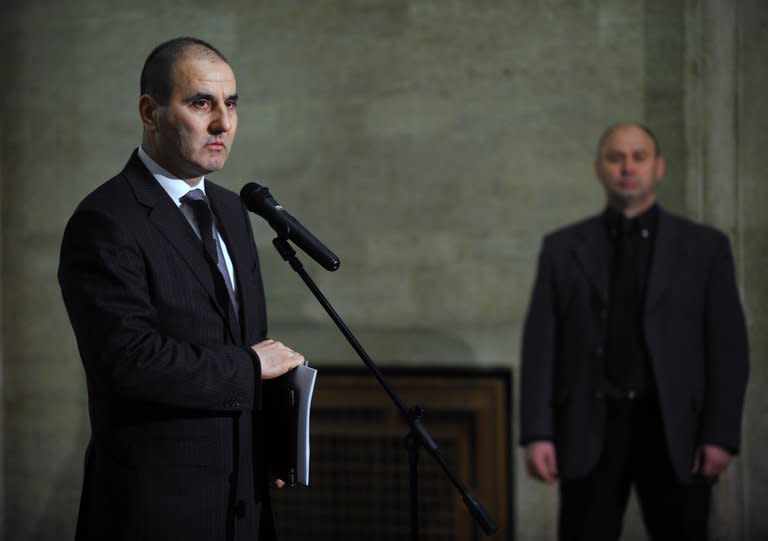Bulgarian government quits after days of protests
Bulgaria's prime minister announced Wednesday the surprise resignation of his government after days of sometimes violent rallies, paving the way for early elections in the European Union's poorest member. "It is the people who put us in power and we give it back to them today," Boyko Borisov told parliament. "I will not participate in a government where the police beat people up or where threats for protests replace political dialogue," he said. Parliament, where Borisov's GERB party holds a near majority, was expected to accept the resignation when it meets at 9:00 am (0700 GMT) Thursday. With both Borisov and his opposition Socialists refusing to form a new cabinet under the current parliament, a caretaker government of experts will have to be appointed by the president to organise early elections. The vote will most likely take place in late April. Bulgaria has been shaken over the past 10 days by nationwide protests first sparked by soaring electricity prices that later snowballed into bitter anger against deepening poverty and widespread corruption in the country. The small Balkan economy has avoided any major turmoil amid the global crisis but Borisov's severely cash-strapped government had frozen public salaries at about 400 euros ($534) and typical pensions at 138 euros ($184) for the past three years. Frustration was particularly heightened by a 13-percent rise in electricity prices in July that doubled winter-season bills as utility and food expenses eat up most of Bulgarians' incomes. Unemployment hit 11.9 percent of the workforce in January, official data showed, but unions said the real figure was 17 or 18 percent. The protests got out of hand this week, when tens of thousands of people staged daily rallies across the country, shouting "Mafia!", "Garbage!" and "Resign!" in what was the largest spontaneous outburst of public anger in the country since 1997. Violent clashes erupted on Monday and Tuesday night with running battles between protestors and police leaving 28 people injured. Two men also reportedly set themselves on fire, one of whom -- an unemployed mentally ill -- has died while the other was in hospital with 80-percent burns. Borisov attempted to take the heat out of the crisis by announcing on Monday the sacking of the unpopular finance minister and on Tuesday saying he would revoke the licence of Czech electricity firm CEZ and try to lower electricity prices by 8.0 percent. "There is nothing more we could do, we gave the maximum... I do not want to see blood on the streets again," the premier said Wednesday. Analysts have long said that people's empty cupboards were set to cause the once hugely popular Borisov to lose his sway with voters as the end of his government's term in July neared. The 53-year-old former firefighter, bodyguard of communist dictator Todor Zhivkov and police chief came to power in 2009 with pledges to root out organised crime and corruption and improve living standards. A failure to do that however eroded support for his GERB party to about 22 percent, allowing the opposition Socialists to catch up in the polls, a recent Gallup poll showed. With a political crisis now adding to people's economic woes, analysts expressed doubts on Wednesday that the resignation would be enough to assuage the tensions, while the country entered a long period of instability. Fresh protests, even if less numerous, were held across the country late on Wednesday. About 1,000 demonstrators in Sofia again blocked a key downtown crossroads as they attempted to march on the parliament building, encircled since Tuesday with anti-riot metal fences. Police prevented protesters from clashing with a small group of government supporters that had also gathered outside parliament. A new massive rally was scheduled for Sunday. An Alpha Research poll on Wednesday showed that 85 percent of Bulgarians support the protests. Opinions were however polarised about Borisov's shock resignation with 50 percent backing it and 47 percent against. As much as 73 percent of the people favoured the formation of a caretaker cabinet, Alpha Research analyst Boryana Dimitrova said, warning that people's trust in political parties was "dangerously low."




